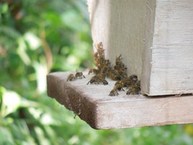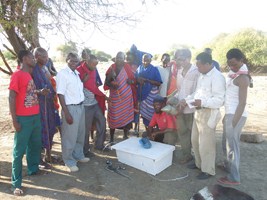
 Some of the new Maasai member of UWAVU.
Some of the new Maasai member of UWAVU. UWAVU promises to give 20% of the net profit to the local community of Njaktai sub-village which will go to community initiatives related to education, health, environment, and food security. Such kind of social responsibility is not really practiced in this area as of yet, and this could be the start of a bigger return for the local communities from successful businesses. KIHO will train the new members of UWAVU in managerial, administrative and financial matters. Such training will allow the Maasai members to eventually form a group of their own. Moreover, KIHO will provide marketing strategies to increase profit and potential markets. Yet, the most important thing for the moment is to get the grant from the U.S. embassy in the first place. So please keep the fingers crossed!
 RSS Feed
RSS Feed
